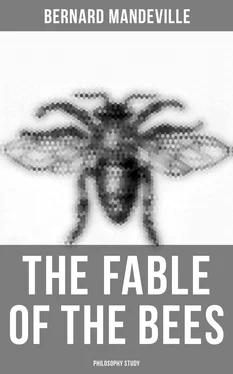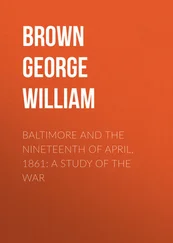To prove my assertion, we have but to observe what generally passes between the winner and the loser. The first is always complaisant, and if the other will but keep his temper, more than ordinary obliging; he is ever ready to humour the loser, and willing to rectify his mistakes with precaution, and the height of good manners. The loser is uneasy, captious, morose, and perhaps swears and storms; yet as long as he says or does nothing designedly affronting, the winner takes all in good part, without offending, disturbing, or contradicting him. Losers, says the proverb, must have leave to rail: All which shows that the loser is thought in the right to complain, and for that very reason pitied. That we are afraid of the loser’s ill-will, is plain from our being conscious that we are displeased with those we lose to, and envy we always dread when we think ourselves happier than others: From whence it follows, that when the winner endeavours to conceal his gains, his design is to avert the mischiefs he apprehends, and this is self-preservation; the cares of which continue to affect us as long as the motives that first produced them remain.
But a month, a week, or perhaps a much shorter time after, when the thoughts of the obligation, and consequently the winner’s gratitude, are worn off, when the loser has recovered his temper, laughs at his loss, and the reason of the winner’s pity ceases; when the winner’s apprehension of drawing upon him the ill-will and envy of the loser is gone; that is to say, as soon as all the passions are over, and the cares of self-preservation employ the winner’s thoughts no longer, he will not only make no scruple of owning what he has won, but will, if his vanity steps in, likewise, with pleasure, brag off, if not exaggerate his gains.
It is possible, that when people play together who are at enmity, and perhaps desirous of picking a quarrel, or where men playing for trifles contend for superiority of skill, and aim chiefly at the glory of conquest, nothing shall happen of what I have been talking of. Different passions oblige us to take different measures; what I have said I would have understood of ordinary play for money, at which men endeavour to get, and venture to lose what they value: And even here I know it will be objected by many, that though they have been guilty of concealing their gains, yet they never observed those passions which I allege as the causes of that frailty; which is no wonder, because few men will give themselves leisure, and fewer yet take the right method of examining themselves as they should do. It is with the passions in men, as it is with colours in cloth: It is easy to know a red, a green, a blue, a yellow, a black, &c. in as many different places; but it must be an artist that can unravel all the various colours and their proportions, that make up the compound of a well-mixed cloth. In the same manner, may the passions be discovered by every body whilst they are distinct, and a single one employs the whole man; but it is very difficult to trace every motive of those actions that are the result of a mixture of passions.
Line 163. And virtue, who from politics
Has learn’d a thousand cunning tricks,
Was, by their happy influence,
Made friends with vice.——
It may be said, that virtue is made friends with vice, when industrious good people, who maintain their families, and bring up their children handsomely, pay taxes, and are several ways useful members of the society, get a livelihood by something that chiefly depends on, or is very much influenced by the vices of others, without being themselves guilty of, or accessary to them, any otherwise than by way of trade, as a druggist may be to poisoning, or a sword-cutler to blood-shed.
Thus the merchant, that sends corn or cloth into foreign parts to purchase wines and brandies, encourages the growth or manufactory of his own country; he is a benefactor to navigation, increases the customs, and is many ways beneficial to the public; yet it is not to be denied, but that his greatest dependence is lavishness and drunkenness: For, if none were to drink wine but such only as stand in need of it, nor any body more than his health required, that multitude of wine-merchants, vintners, coopers, &c. that make such a considerable show in this flourishing city, would be in a miserable condition. The same may be said not only of card and dice-makers, that are the immediate ministers to a legion of vices; but that of mercers, upholsterers, tailors, and many others, that would be starved in half a year’s time, if pride and luxury were at once to be banished the nation.
Line 167. The worst of all the multitude
Did something for the common good.
This, I know, will seem to be a strange paradox to many; and I shall be asked what benefit the public receives from thieves and house-breakers. They are, I own, very pernicious to human society, and every government ought to take all imaginable care to root out and destroy them; yet if all people were strictly honest, and nobody would meddle with, or pry into any thing but his own, half the smiths of the nation would want employment; and abundance of workmanship (which now serves for ornament as well as defence) is to be seen every where both in town and country, that would never have been thought of, but to secure us against the attempts of pilferers and robbers.
If what I have said be thought far fetched, and my assertion seems still a paradox, I desire the reader to look upon the consumption of things, and he will find that the laziest and most unactive, the profligate and most mischievous, are all forced to do something for the common good, and whilst their mouths are not sowed up, and they continue to wear and otherwise destroy what the industrious are daily employed about to make, fetch and procure, in spite of their teeth obliged to help, maintain the poor and the public charges. The labour of millions would soon be at an end, if there were not other millions, as I say, in the fable.
————Employ’d,
To see their handy-works destroy’d.
But men are not to be judged by the consequences that may succeed their actions, but the facts themselves, and the motives which it shall appear they acted from. If an ill-natured miser, who is almost a plumb, and spends but fifty pounds a-year, though he has no relation to inherit his wealth, should be robbed of five hundred or a thousand guineas, it is certain, that as soon as this money should come to circulate, the nation would be the better for the robbery, and receive the same, and as real a benefit from it, as if an archbishop had left the same sum to the public; yet justice, and the peace of society, require that he or they who robbed the miser should be hanged, though there were half a dozen of them concerned.
Thieves and pick-pockets steal for a livelihood, and either what they can get honestly is not sufficient to keep them, or else they have an aversion to constant working: they want to gratify their senses, have victuals, strong drink, lewd women, and to be idle when they please. The victualler, who entertains them, and takes their money, knowing which way they come at it, is very near as great a villain as his guests. But if he fleeces them well, minds his business, and is a prudent man, he may get money, and be punctual with them he deals with: The trusty out-clerk, whose chief aim is his master’s profit, sends him in what beer he wants, and takes care not to lose his custom; while the man’s money is good, he thinks it no business of his to examine whom he gets it by. In the mean time, the wealthy brewer, who leaves all the management to his servants, knows nothing of the matter, but keeps his coach, treats his friends, and enjoys his pleasure with ease and a good conscience; he gets an estate; builds houses, and educates his children in plenty, without ever thinking on the labour which wretches perform, the shifts fools make, and the tricks knaves play to come at the commodity, by the vast sale of which he amasses his great riches.
Читать дальше












